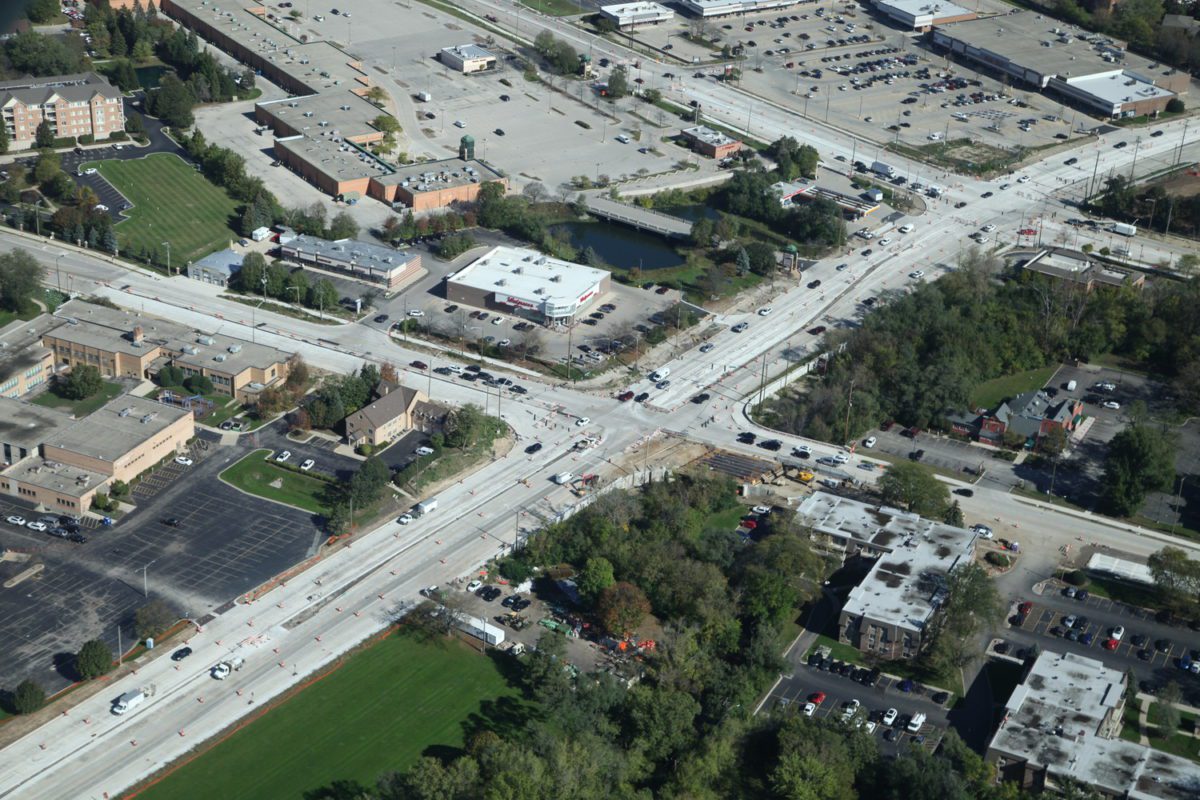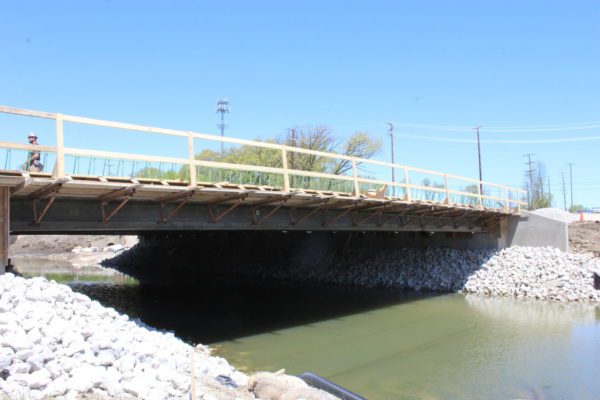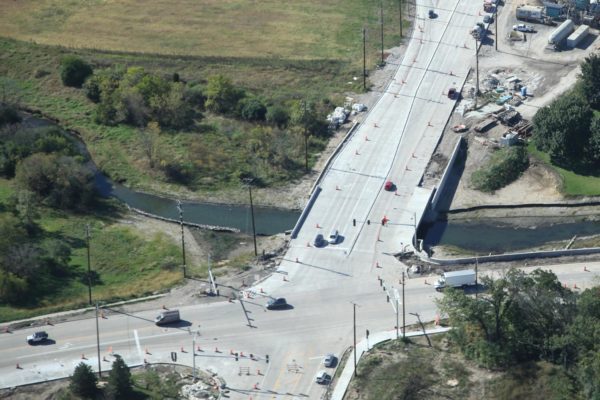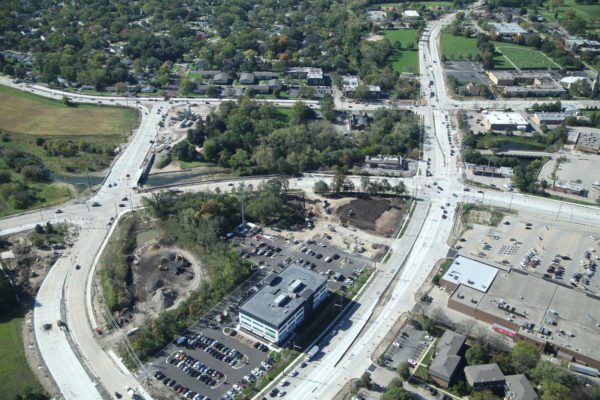
Lake Cook Road is a critical regional arterial — a heavily traveled east-west roadway that cuts a swath across multiple northern suburbs, contains many major interchanges with significant north-south interstate routes, and is under the jurisdiction of Cook County Department of Transportation and Highways (CCDOTH). With significantly deteriorated and poor pavement conditions, a full reconstruction was the primary purpose of the project with an overall goal of improving safety by better accommodating traffic and pedestrians.
Civiltech provided both Phase I and Phase II Design Engineering services on this critical and extensive, $58 million improvement which included a complete reconstruction and widening of the county highway corridor, complex intersection design, structural design, drainage, and additional transportation engineering components as described herein.
Designing to Accommodate Traffic Loads
The reconstruction of Lake Cook involved completely new concrete pavement to provide a long-term improvement of the roadway. Expanding the road to three through lanes in each direction opens up the heavily traveled roadway accommodating heavy traffic loads. Additional turn lanes were provided at the intersections with Buffalo Grove Road, IL Route 83, and Weiland Road. Weiland Road was also extended south of IL Route 83 to a new intersection with Buffalo Grove Road at St. Mary’s Parkway.
Bridging and Realigning Buffalo Creek 
Structural design included the widening in-kind and redecking of the existing single span steel beam structure carrying Buffalo Grove Road over Buffalo Creek and the replacement of the existing triple cell box culvert carrying Short Aptakisic Road over Buffalo Creek with a new, single-span PPC I-beam bridge. Structural engineering tasks included the preparation of Bridge Condition Reports, Type, Size and Location plans, and detailed design plans for both structures. Civiltech also completed a detailed hydraulic and floodway analysis for the new bridge structure and obtained an IDNR Floodway permit, USACE 404 permit, and MWRD Watershed Management Ordinance Permit for the proposed bridge replacement and channel realignment.
Due to the widening and the realignment of the roadway, as well as an existing streambank erosion issue, the existing channel and floodway of Buffalo Creek were realigned and regraded in the vicinity (upstream and downstream) of the proposed structure. Other proposed stream improvements included boulder shoreline revetments, boulder riffles, and boulder cross vanes.

The proposed Buffalo Creek realignment design shifted the existing channel approximately 60 feet to the southwest. This realignment was intended to correct eroding and collapsing shorelines, better align the proposed structure with the waterway, improve water quality, and enhance wetland and riparian environments. The design restored the natural curvature in the channel and in-stream features including two boulder shoreline revetments, three boulder riffles, four pools, three boulder cross vanes, and one boulder j-hook. Adjacent wetland and riparian environments were created or enhanced through development of flat or depressional grading, native seed and plug vegetation mixes, and replacement of 48 trees with 75 native trees.
Additional Design Services
The improvement included many additional design components provided in-house by Civiltech’s multi-disciplined staff. A continuous lighting system was designed for the length of the entire project, and extensive signal design was required with new traffic signals at nine intersections. Also, at the east end of Lake Cook Road, new noise walls were installed to mitigate the impact of the wider roadway to adjacent residences.
The project involved Civiltech’s Right of Way team as land acquisition was required from 48 parcels. The acquisitions ranged from temporary easements for minor grading to full parcel acquisition for construction of a large detention basin.
The project involved a plethora of stakeholders, and extensive interagency coordination was required. The Cook County Department of Transportation and Highways acted as the lead agency, however roadways impacted by the project included those under the jurisdiction of the Lake County Division of Transportation, IDOT, and the Villages of Buffalo Grove and Wheeling. Civiltech acted as a liaison between all of the agencies and assisted with the preparation of the necessary intergovernmental agreements.
Previous Phase I Study and Securing Funding
Prior to the Lake Cook Road improvement Design Engineering, Civiltech prepared a Phase I Study that included this project and over 3 miles of reconstruction on Weiland Road. The study looked at relieving congestion, improving safety, and providing better bike and pedestrian facilities. An Environmental Assessment and a Combined Design Report were prepared. Due to highway noise impacts in the project corridor, extensive public outreach was conducted to educate and obtain input from affected property owners. 
Although the Phase I and Phase II Engineering was locally funded, Civiltech assisted the Village of Buffalo Grove and the Cook County Department of Transportation and Highways in securing CMAQ and STP Federal funding for construction. Upon completion of Phase I, Civiltech’s Phase II Design Engineering services were divided into two contracts including this project and a separate Weiland Road reconstruction and widening project.
New Adjacent Projects Underway
The successful outcome of this project led to Civiltech currently providing design engineering services on a new section of Lake Cook Road immediately to the west from Raupp Boulevard and Arlington Heights Road. Civiltech is providing a Phase I Preliminary Engineering study of Lake Cook Road between Arlington Heights Road and Raupp Boulevard for the Village of Buffalo Grove. The study is being conducted to evaluate additional improvements to the corridor and intersecting roadways. The study and forthcoming design work is being done in accordance with IDOT and CCDOTH standards and the federal funding processes, with the goal of obtaining federal funding for this next section of major reconstruction and widening.
Understanding that the Phase I, Phase II and Land Acquisition phases of federally funded projects takes many years to progress, CCDOTH recognized the need to provide a near term solution to the deteriorating Lake Cook Road pavement. To that end, Civiltech is also currently providing design engineering services to CCDOTH for a separate intermediate rehabilitation project to be let in 2023.The interim project resurfaces the roadway within the same project limits as the Phase I study. The scope of the work includes full curb and gutter replacement, and pavement resurfacing.
